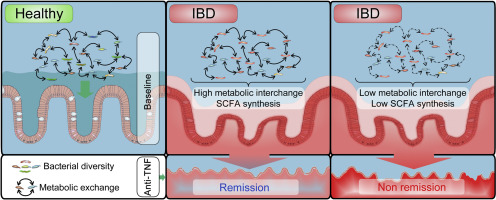当前位置:
X-MOL 学术
›
Gastroenterology
›
论文详情
Our official English website, www.x-mol.net, welcomes your
feedback! (Note: you will need to create a separate account there.)
Metabolic Functions of Gut Microbes Associate With Efficacy of Tumor Necrosis Factor Antagonists in Patients With Inflammatory Bowel Diseases.
Gastroenterology ( IF 25.7 ) Pub Date : 2019-07-18 , DOI: 10.1053/j.gastro.2019.07.025 Konrad Aden 1 , Ateequr Rehman 2 , Silvio Waschina 3 , Wei-Hung Pan 2 , Alesia Walker 4 , Marianna Lucio 4 , Alejandro Mena Nunez 2 , Richa Bharti 2 , Johannes Zimmerman 3 , Johannes Bethge 5 , Berenice Schulte 5 , Dominik Schulte 5 , Andre Franke 2 , Susanna Nikolaus 5 , Johann Oltmann Schroeder 5 , Doris Vandeputte 6 , Jeroen Raes 6 , Silke Szymczak 7 , Georg H Waetzig 8 , Rainald Zeuner 5 , Philippe Schmitt-Kopplin 4 , Christoph Kaleta 3 , Stefan Schreiber 1 , Philip Rosenstiel 2
Gastroenterology ( IF 25.7 ) Pub Date : 2019-07-18 , DOI: 10.1053/j.gastro.2019.07.025 Konrad Aden 1 , Ateequr Rehman 2 , Silvio Waschina 3 , Wei-Hung Pan 2 , Alesia Walker 4 , Marianna Lucio 4 , Alejandro Mena Nunez 2 , Richa Bharti 2 , Johannes Zimmerman 3 , Johannes Bethge 5 , Berenice Schulte 5 , Dominik Schulte 5 , Andre Franke 2 , Susanna Nikolaus 5 , Johann Oltmann Schroeder 5 , Doris Vandeputte 6 , Jeroen Raes 6 , Silke Szymczak 7 , Georg H Waetzig 8 , Rainald Zeuner 5 , Philippe Schmitt-Kopplin 4 , Christoph Kaleta 3 , Stefan Schreiber 1 , Philip Rosenstiel 2
Affiliation

|
BACKGROUND & AIMS
Altered interactions between the mucosal immune system and intestinal microbiota contribute to pathogenesis of inflammatory bowel diseases (IBD). It is not clear how inhibitors of cytokines, such as antagonists of tumor necrosis factor (anti-TNF), affect the intestinal microbiome. We investigated the effects of anti-TNF agents on gut microbe community structure and function in a longitudinal 2-step study of patients with IBD. We correlated our findings with outcomes of treatment and investigated patterns of metabolites in fecal samples before and after anti-TNF therapy.
METHODS
We performed a prospective study of 2 cohorts of patients in Germany; the discovery cohort comprised 12 patients with IBD, 17 patients with rheumatic disease, and 19 healthy individuals (controls); fecal samples were collected at baseline and 2, 6, and 30 weeks after induction of anti-TNF therapy. The validation cohort comprised 23 patients with IBD treated with anti-TNF or vedolizumab (anti-α4β7 integrin) and 99 healthy controls; fecal samples were collected at baseline and at weeks 2, 6, and 14. Fecal microbiota were analyzed by V3-V4 16S ribosomal RNA gene amplicon sequencing. Clinical response and remission were determined by clinical disease activity scores. Metabolic network reconstruction and associated fecal metabolite level inference was performed in silico using the AGORA (Assembly of Gut Organisms through Reconstruction and Analysis) resource. Metabolomic analyses of fecal samples from a subset of patients were performed to validate metabolites associated with treatment outcomes.
RESULTS
Anti-TNF therapy shifted the diversity of fecal microbiota in patients with IBD, but not with rheumatic disease, toward that of controls. Across timepoints, diversity indices did not vary significantly between patients with IBD who did or did not achieve clinical remission after therapy. In contrast, in silico modeling of metabolic interactions between gut microbes found metabolite exchange to be significantly reduced at baseline in fecal samples from patients with IBD and to be associated with later clinical remission. Predicted levels of butyrate and substrates involved in butyrate synthesis (ethanol or acetaldehyde) were significantly associated with clinical remission following anti-TNF therapy, verified by fecal metabolomic analyses.
CONCLUSIONS
Metabolic network reconstruction and assessment of metabolic profiles of fecal samples might be used to identify patients with IBD likely to achieve clinical remission following anti-TNF therapy and increase our understanding of the heterogeneity of IBD.
中文翻译:

肠道微生物的代谢功能与炎症性肠病患者肿瘤坏死因子拮抗剂的功效有关。
背景与目的粘膜免疫系统和肠道菌群之间相互作用的改变导致炎症性肠病(IBD)的发病机理。尚不清楚细胞因子抑制剂,例如肿瘤坏死因子拮抗剂(抗TNF)如何影响肠道微生物组。我们在IBD患者的纵向2步研究中调查了抗TNF剂对肠道微生物群落结构和功能的影响。我们将我们的发现与治疗结果相关联,并研究了抗TNF治疗前后粪便样品中代谢产物的模式。方法我们对德国的2个患者进行了前瞻性研究。发现队列包括12名IBD患者,17名风湿性疾病患者和19名健康个体(对照组);在基线和2、6时收集粪便样本 诱导抗TNF治疗后30周。验证队列包括23名接受抗TNF或维多珠单抗(抗α4β7整联蛋白)治疗的IBD患者和99名健康对照。在基线以及第2、6和14周收集粪便样品。通过V3-V4 16S核糖体RNA基因扩增子测序分析粪便微生物群。通过临床疾病活动评分确定临床反应和缓解。使用AGORA(通过重建和分析组装肠道生物)资源通过计算机进行了代谢网络重建和相关的粪便代谢产物水平推断。对一部分患者粪便样本进行了代谢组学分析,以验证与治疗结果相关的代谢产物。结果抗TNF治疗改变了IBD患者的粪便菌群多样性,但风湿病则不如对照组。在各个时间点上,在治疗后达到或未达到临床缓解的IBD患者之间,多样性指数没有显着差异。相反,在肠道微生物之间的代谢相互作用的计算机模拟中,发现IBD患者粪便样本中的代谢物交换在基线时明显减少,并且与以后的临床缓解相关。粪便代谢组学分析证实,抗TNF治疗后,丁酸和参与丁酸合成(乙醇或乙醛)的底物的预测水平与临床缓解显着相关。
更新日期:2019-11-18
中文翻译:

肠道微生物的代谢功能与炎症性肠病患者肿瘤坏死因子拮抗剂的功效有关。
背景与目的粘膜免疫系统和肠道菌群之间相互作用的改变导致炎症性肠病(IBD)的发病机理。尚不清楚细胞因子抑制剂,例如肿瘤坏死因子拮抗剂(抗TNF)如何影响肠道微生物组。我们在IBD患者的纵向2步研究中调查了抗TNF剂对肠道微生物群落结构和功能的影响。我们将我们的发现与治疗结果相关联,并研究了抗TNF治疗前后粪便样品中代谢产物的模式。方法我们对德国的2个患者进行了前瞻性研究。发现队列包括12名IBD患者,17名风湿性疾病患者和19名健康个体(对照组);在基线和2、6时收集粪便样本 诱导抗TNF治疗后30周。验证队列包括23名接受抗TNF或维多珠单抗(抗α4β7整联蛋白)治疗的IBD患者和99名健康对照。在基线以及第2、6和14周收集粪便样品。通过V3-V4 16S核糖体RNA基因扩增子测序分析粪便微生物群。通过临床疾病活动评分确定临床反应和缓解。使用AGORA(通过重建和分析组装肠道生物)资源通过计算机进行了代谢网络重建和相关的粪便代谢产物水平推断。对一部分患者粪便样本进行了代谢组学分析,以验证与治疗结果相关的代谢产物。结果抗TNF治疗改变了IBD患者的粪便菌群多样性,但风湿病则不如对照组。在各个时间点上,在治疗后达到或未达到临床缓解的IBD患者之间,多样性指数没有显着差异。相反,在肠道微生物之间的代谢相互作用的计算机模拟中,发现IBD患者粪便样本中的代谢物交换在基线时明显减少,并且与以后的临床缓解相关。粪便代谢组学分析证实,抗TNF治疗后,丁酸和参与丁酸合成(乙醇或乙醛)的底物的预测水平与临床缓解显着相关。











































 京公网安备 11010802027423号
京公网安备 11010802027423号